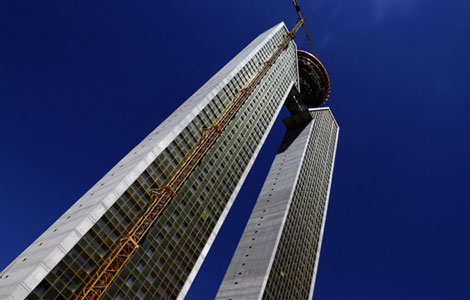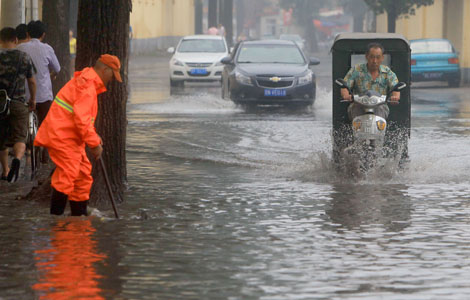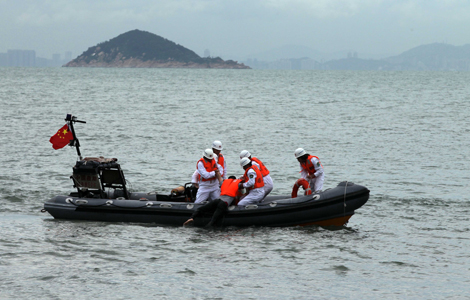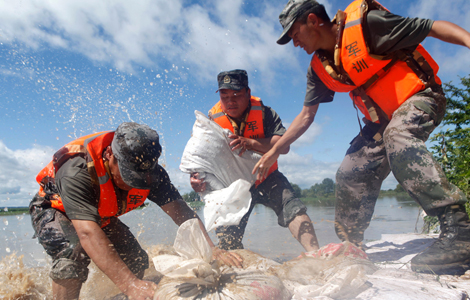Sino-Russian border trade has potential: Experts
Updated: 2013-08-12 09:46
(Xinhua)
|
||||||||
SUIFENHE -- Experts attending a trade expo in northeast China's Heilongjiang province said more efforts should be made to tap border trade potential between China and Russia, as trade volume between the two countries is likely to exceed $100 billion this year.
"Although the Sino-Russia trade slightly dipped in the first half of the year, it is highly possible that the full-year trade volume will reach $100 billion as a result of closer cooperation between the two countries in the energy sector," said Zhang Wei, vice chairman of the China Chamber of International Commerce.
Zhang made the remarks at the China Suifenhe International Port Trade Expo held in the past week in the border city of Suifenhe in Heilongjiang.
Statistics from the General Administration of Customs show that trade between the two countries dropped 1.2 percent in the first half of the year to $43.18 billion.
During President Xi Jinping's visit to Russia in March, the two countries agreed to boost their annual trade volume to $100 billion by 2015 and $200 billion by 2020.
Xing Guangcheng, a researcher with the Chinese Academy of Social Sciences, said the small population in the vast territory of Russia's Far East has hindered trade development between the two countries.
"However, Sino-Russian trade will be revitalized, as Russia is scaling up development in the region. The 100-billion-dollar trade target might be fulfilled in advance," Xing said.
Zhang said the realization of the target will mainly rely on the strengthening of energy cooperation between the two countries.
He also said China and Russia need to boost cooperation in technology, agriculture and tourism.
"In particular, the two countries should jointly explore the great potential that exists in border and port trade," Zhang said.
Heilongjiang, which is considered a gateway between China and Russia, shares a 3,000 km border with Russia. Large quantities of goods and raw materials are traded through the province's ports.
"China and Russia are complementary in terms of their trade advantages and there is great potential in developing border trade," said Sergey Paltov, consul general of the Consulate General of the Russian Federation in Shenyang.
Zhang said China needs to boost the development of border and port trade in order to revitalize overall trade amid slowing economic growth.
"The next three decades will be a crucial time for China's border port development," Zhang said.
However, problems such as insufficient infrastructure and cumbersome customs procedures have constrained the two countries' border trade, Zhang noted.
He said China should step up infrastructure construction in border and port areas and strengthen international cooperation in order to facilitate trade.
Paltov said the biggest problem for Sino-Russian border trade is insufficient infrastructure.
"Cross-border infrastructure must be improved for this end and both countries need to invest more in improving infrastructure such as railways, roads, ports and bridges," he said.

 Spanish skyscraper forgets elevator
Spanish skyscraper forgets elevator
 Beijing rainstorm cancels flights, kills airport worker
Beijing rainstorm cancels flights, kills airport worker
 Highs and lows of marine rescue
Highs and lows of marine rescue
 Lin Dan wins Olympic final rematch over injured Lee
Lin Dan wins Olympic final rematch over injured Lee
 Northeast China braces for major floods
Northeast China braces for major floods
 High-heeled, well heeled
High-heeled, well heeled
 Thunder storm hits Beijing, darkening the sky
Thunder storm hits Beijing, darkening the sky
 Fans stay away as worlds get off to sweaty start
Fans stay away as worlds get off to sweaty start
Most Viewed
Editor's Picks

|

|

|

|

|

|
Today's Top News
New green policy gives industries a big boost
Northeast China braces for major floods
Launches highlight India's ambitions
Chinese put on alert in Afghanistan
Questioning China's achievements
Go-between helped to cement deal
The only way now is up
Japan to carry out self-defense
US Weekly

|

|




